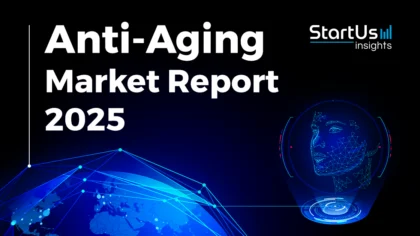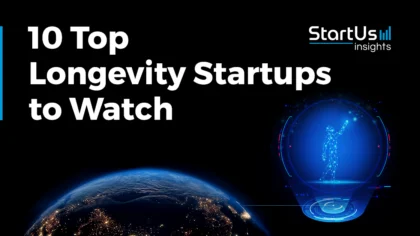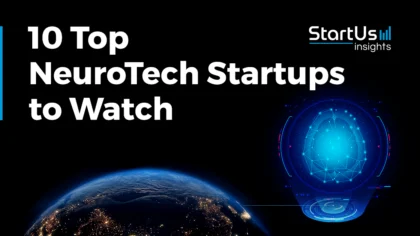Accelerate Productivity in 2025
Reignite Growth Despite the Global Slowdown
Despite the challenges caused by the COVID-19 pandemic and increasing economic uncertainty, 2020 still managed to produce thousands of startups. To introduce you to 7 emerging startups founded in 2020, we analyzed 10.880 healthcare startups. All of them develop innovative solutions spanning from artificial intelligence (AI) to medical devices and mental health.
The 7 promising HealthTech startups you should watch in 2021 were hand-picked based on our data-driven startup scouting approach, taking into account factors such as location, founding year, and relevance of technology, among others. The 10.880 companies that were analyzed for this report are identified using the StartUs Insights Discovery Platform, covering 1.379.000+ startups & scaleups globally. When you are looking for up-to-date healthcare solutions for your innovation units, R&D, or product development department, the StartUs Insights Discovery Platform gives you the most exhaustive collection and ensures you continuously discover new startups, scaleups, and technologies.
Global Startup Heat Map: 7 Healthcare Startups to Watch in 2021
The Global Startup Heat Map below highlights 7 healthcare startups, established in 2020, developing technology-driven solutions for the healthcare industry. Moreover, you can explore global hotspots for healthcare startups and even download this graphic to include in your next presentation.
bots4impact – Chatbots
 The abundance of medical information available online drives emerging HealthTech startups to develop virtual assistants or chatbots. Developers of chatbots ensure that users are able to access information vetted by health experts and doctors. In this way, AI-powered chatbots considerably reduce misinformation for people seeking answers about their health.
The abundance of medical information available online drives emerging HealthTech startups to develop virtual assistants or chatbots. Developers of chatbots ensure that users are able to access information vetted by health experts and doctors. In this way, AI-powered chatbots considerably reduce misinformation for people seeking answers about their health.
Canadian startup bots4impact creates chatbot-driven campaigns to help hospitals and wellness clinics recruit, educate, and engage target customers. The startup’s chatbots combine AI and deep content expertise to offer solutions for health and wellness, genetics, life sciences, and public health. bots4impact handles the entire chatbot development & deployment process and provides chatbot analytics to help healthcare institutions understand what their patients are looking for.
CalcLab – Laboratory Test Interpretation Software
 One of the more frustrating aspects of healthcare involves considerable waiting time for medical laboratory test results to return. Typically, doctors prescribe certain diagnostic tests to patients to then decide if others are required. This process causes delays in diagnosis and sometimes leads to poor healthcare outcomes. Emerging healthcare startups provide laboratory testing solutions to improve the speed and accuracy of diagnostics.
One of the more frustrating aspects of healthcare involves considerable waiting time for medical laboratory test results to return. Typically, doctors prescribe certain diagnostic tests to patients to then decide if others are required. This process causes delays in diagnosis and sometimes leads to poor healthcare outcomes. Emerging healthcare startups provide laboratory testing solutions to improve the speed and accuracy of diagnostics.
CalcLab is a Brazillian startup enabling healthcare professionals to conduct an in-depth interpretation of laboratory results. The startup offers its own set of rules or allows clients to customize the rules for interpretation. After setting the ideal medical reference values, CalcLab’s software applies hundreds of interpretation rules in a matter of seconds. The solution saves valuable time for both medical practitioners and patients.
Deliberate Solutions – AI-based Behavioral Health Analysis
 In some cases, it may take years for psychiatrists to understand what troubles their patients. This happens due to an unwillingness from patients to disclose exact details or therapists’ high workload. By securely deploying cameras and microphones in the therapists’ offices, AI algorithms analyze body language, facial expressions, and other visual and audio cues to assist therapists in identifying the underlying issues in their patients.
In some cases, it may take years for psychiatrists to understand what troubles their patients. This happens due to an unwillingness from patients to disclose exact details or therapists’ high workload. By securely deploying cameras and microphones in the therapists’ offices, AI algorithms analyze body language, facial expressions, and other visual and audio cues to assist therapists in identifying the underlying issues in their patients.
Based out of the US, Deliberate Solutions is a behavioral health startup utilizing machine learning (ML) techniques to improve patient outcomes. The startup enables psychiatrists to record and store confidential digital media using its hardware and cloud integration tools. The startup then utilizes its platform to objectively measure a variety of mental health symptoms. The platform also provides auto-transcription, annotation, supervision tools, and digital consent management to help therapists save time and improve the quality of care. Furthermore, the solution easily integrates with electronic health records (EHRs), outcome measurement systems, and patient engagement tools.
MedicPad – Medical Software Management System
 Inefficient patient onboarding processes in hospitals cause significant stress for patients. Before being admitted, patients are required to fill in lengthy forms and sign several documents. This often leads to confusion about the healthcare process and negatively impacts patient experiences. Technology startups are working on ways to digitally integrate various pre-admission processes to improve access to information for both patients and medical practitioners.
Inefficient patient onboarding processes in hospitals cause significant stress for patients. Before being admitted, patients are required to fill in lengthy forms and sign several documents. This often leads to confusion about the healthcare process and negatively impacts patient experiences. Technology startups are working on ways to digitally integrate various pre-admission processes to improve access to information for both patients and medical practitioners.
Dutch startup MedicPad offers a suite of technology-driven solutions to improve medical and clinical management. The startup offers smart forms to reduce the time spent on completing forms and self-check-in kiosks to ease patient onboarding. MedicPad also curates highly-relevant digital medical records to efficiently schedule doctor appointments. The startup’s products include AI-powered chatbots, medical and patient analytics software, as well as wearable devices for patient monitoring.
Flatechs – Needle Localization
 A high level of activity and numerous personnel inside operating theatres sometimes results in central line infections and other related complications. However, with the help of novel medical tools, this is a preventable situation. Emerging startups are developing innovative central venous access devices (CVADs) to improve healthcare delivery in hospitals.
A high level of activity and numerous personnel inside operating theatres sometimes results in central line infections and other related complications. However, with the help of novel medical tools, this is a preventable situation. Emerging startups are developing innovative central venous access devices (CVADs) to improve healthcare delivery in hospitals.
Flatechs is a Dutch startup that aims to provide a visualized syringe for decreasing or even eliminating fatal accidents caused by risky central venous lines. The EpiFaith CV incorporates a built-in auto-aspiration and pressure detecting mechanism that allows users to focus on needle control and avoid arterial catheterization. Since EpiFaith CV’s mechanism enables direct insertion of the guidewire, users are able to restart needle localization at any time without disconnecting the syringe.
Exos Armor – 3D-Printed Orthopedic Corset
 From 3D printing bones and tissues to creating customized prosthetic devices, additive manufacturing technology already transforms the healthcare industry. 3D printing also reduces the cost and time required to start using the final products. Both patients and hospitals gain from adopting, and opting for, utilizing in-hospital additive manufacturing systems.
From 3D printing bones and tissues to creating customized prosthetic devices, additive manufacturing technology already transforms the healthcare industry. 3D printing also reduces the cost and time required to start using the final products. Both patients and hospitals gain from adopting, and opting for, utilizing in-hospital additive manufacturing systems.
Exos Armor is an Italian startup looking to overhaul the design, production, and functionality of orthopedic corsets. The startup utilizes additive manufacturing technology to create lightweight, highly-customizable, and breathable orthopedic corsets for people of all ages. Exos Armor’s advanced processes enable the production of tailor-made corsets a few days after visiting the orthopedic clinic. Furthermore, orthopedic corsets are made using recyclable materials to further reduce the use of gypsum and other processing waste.
StimVeda – Non-Invasive Neural Interfaces
 Brain-computer interfaces, also called neural interfaces, enable the control and management of surrounding environments by users simply thinking about it. This technology is made possible through extensive research and development (R&D) in the electroencephalogram (EEG), electrocorticography (ECoG), virtual reality (VR), and augmented reality (AR)-related neuro-engineering technologies. Neural interfaces are also gaining traction with the recent launch of Elon Musk’s Neuralink. Emerging startups offer non-invasive neural interfaces for patients suffering from paralysis or speaking difficulties, among other ailments.
Brain-computer interfaces, also called neural interfaces, enable the control and management of surrounding environments by users simply thinking about it. This technology is made possible through extensive research and development (R&D) in the electroencephalogram (EEG), electrocorticography (ECoG), virtual reality (VR), and augmented reality (AR)-related neuro-engineering technologies. Neural interfaces are also gaining traction with the recent launch of Elon Musk’s Neuralink. Emerging startups offer non-invasive neural interfaces for patients suffering from paralysis or speaking difficulties, among other ailments.
Indian startup StimVeda is developing Ease, a personalized non-invasive brain stimulation device for the treatment of depression. Ease records brain data using EEG and runs it through a machine learning model. Based on the classification of the model, users receive the most suitable stimulation parameters. Later, during the stimulation, users engage in behavioral therapy that includes cognitive games. As a result of a considerably short exercise, and with prolonged use, people suffering from depression experience improved moods and better cognitive strength in addition to feeling more energized.
What does 2021 bring for the Healthcare Industry?
To stay ahead of the technology curve, it is important that you know which technologies and industry trends will impact your company in 2021. You can explore our report on 30 HealthTech Startups Impacting Good Health & Well Being or let us do the work for you. To keep you up-to-date on the latest technology and emerging solutions, we provide you with actionable innovation intelligence – quickly and exhaustively.








